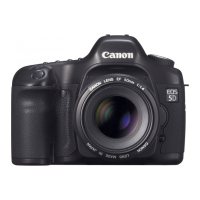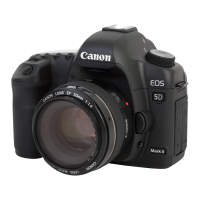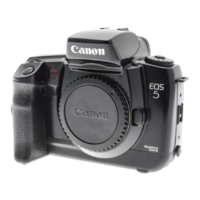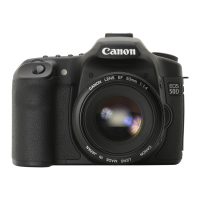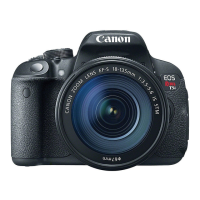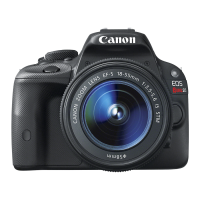Do you have a question about the Canon EOS 5DS and is the answer not in the manual?
Precautions to prevent harm or injury to yourself and others.
Guidelines for safely handling the camera, lens, and accessories.
Details about the specific features of the EOS 5DS R model.
Step-by-step guide for charging the camera's battery pack.
Instructions for inserting and removing memory cards from the camera.
How to turn the camera on and the automatic sensor cleaning process.
Steps to configure the camera's date, time, and time zone settings.
Procedures for attaching and removing lenses from the camera body.
How to hold the camera and adjust viewfinder clarity for optimal shooting.
Explanation of the shutter button's two-step operation and preventing camera shake.
How to use the Mode Dial to select shooting modes.
How to use the Main Dial for adjusting settings.
How to use the Quick Control Dial for quick setting adjustments.
How to use the Multi-controller for navigating menus and selecting options.
How to prevent accidental changes to camera controls using the Multi Function Lock.
How to access and view the Quick Control screen for shooting settings.
Directly selecting and setting shooting functions displayed on the LCD monitor.
Step-by-step guide for navigating and changing camera menu settings.
Instructions for formatting memory cards to prepare them for use.
How to reset all camera settings back to their factory defaults.
Selecting the CF or SD card for recording and playing back images.
Selecting the pixel count and image quality for captured images.
Explanation of RAW image data output and processing.
Adjusting the image capture area and aspect ratio.
Setting the ISO speed (image sensor sensitivity to light).
Selecting a Picture Style to match photographic expression or subject.
Adjusting parameters of Picture Styles like Sharpness, Contrast, etc.
Selecting a base Picture Style and registering it under User Def. slots.
Adjusting white balance to make white areas appear white.
Manually setting white balance for a specific light source for better accuracy.
Correcting the set white balance using a nine-level scale.
Recording three images with different color tones simultaneously.
Automatically correcting image brightness and contrast.
Reducing noise generated in the image, especially at high ISO speeds.
Reducing overexposed, clipped highlights.
Correcting dark image corners and color fringing.
Detecting light source frequency to reduce uneven exposure caused by flicker.
Selecting the color space (sRGB or Adobe RGB) for captured images.
Creating and selecting folders for saving captured images.
Changing the alphanumeric characters in the file name.
Setting the file numbering method (Continuous, Auto Reset, Manual Reset).
Recording copyright information as Exif data.
Camera automatically sets shutter speed and aperture for optimal exposure.
Freely changing shutter speed and aperture combination while maintaining exposure.
Manually setting shutter speed; camera automatically sets aperture for exposure.
Manually setting aperture; camera automatically sets shutter speed for exposure.
Checking the depth of field by stopping down the lens aperture.
Manually setting both shutter speed and aperture for desired exposure.
Setting exposure compensation when ISO speed is set to Auto.
Selecting one of four methods to measure subject brightness.
Adjusting exposure compensation to brighten or darken the image.
Recording three shots with different exposures automatically.
Locking exposure when focus area differs from metering area.
Keeping the shutter open for long exposures by holding the shutter button.
Presetting the bulb exposure time to avoid holding the shutter button.
Capturing and merging three images with different exposures for high dynamic range.
Merging two to nine exposures into a single image.
Reducing blur caused by camera vibrations by keeping the mirror up.
Attaching the eyepiece cover to prevent stray light from entering the viewfinder.
Connecting a remote switch for shooting.
Shooting remotely using a remote controller.
Setting the shooting interval and number of shots for time-lapse movies.
How to enable Live View shooting by setting the switch.
Estimated number of shots possible with Live View shooting based on temperature.
Important cautions regarding image quality and internal temperature.
Setting various shooting functions like Crop/Aspect and WB via the LCD monitor.
Customizing settings specific to Live View shooting.
Setting the AF method (Face+Tracking or FlexiZone-Single) for shooting.
How the camera detects and focuses on human faces.
Focusing with a single AF point on a particular subject.
Important notes regarding AF operation.
Identifying shooting conditions that make focusing difficult.
Steps to start shooting a movie.
Camera automatically controls exposure based on scene brightness.
Manually setting shutter speed; camera sets aperture and ISO.
Manually setting aperture; camera sets shutter speed and ISO.
Automatic ISO speed setting within ISO 100 - ISO 6400 in A mode.
Automatic ISO speed setting within ISO 100 - ISO 6400 in other modes.
Notes regarding shooting modes and their features.
Using EX-series Speedlites with LED lights for movie shooting.
Icons indicating detected scene types in A mode for movie shooting.
Manually setting shutter speed, aperture, and ISO speed for movie shooting.
How to play back images on the camera.
Viewing images one by one on the LCD monitor.
Navigating through images using the dial.
Displaying various shooting information on the screen.
Overlaying grid lines on the image for composition and leveling.
Magnifying captured images for detailed viewing.
Searching for images using index display or jump display.
Comparing two images side by side on the LCD monitor.
Rotating displayed images for correct orientation.
Protecting important images from accidental erasure.
Rating images with marks for organization.
Setting various playback options via the Quick Control screen.
Playing back movies on the camera's LCD monitor or TV set.
Steps to play back movies on the camera's LCD monitor.
Editing out the first and last scenes of a movie.
Playing back images automatically as a slide show.
Displaying camera images and movies on a TV set via HDMI.
Using TV's remote control for playback operations with HDMI CEC compatible TVs.
Copying images from one card to another.
Erasing unnecessary images one by one or in batches.
Selecting multiple images with checkmarks to erase them at once.
Erasing all images in a folder or on a card simultaneously.
Adjusting LCD monitor brightness and auto rotation settings.
Adjusting the LCD monitor brightness automatically or manually.
Automatically rotating vertical images for display on camera and computer.
Processing RAW images in the camera and saving them as JPEG images.
Details on adjusting brightness, white balance, Picture Style, etc.
Resizing JPEG images to lower pixel count and save as a new image.
Cropping JPEG images and saving them as another image.
Information about smudges on the sensor and when to seek professional cleaning.
How the Self Cleaning Sensor Unit automatically shakes off dust.
Manually performing sensor cleaning.
How to disable the automatic sensor cleaning feature.
Appending Dust Delete Data to images for automatic dust spot removal.
Information about Dust Delete Data and its use with EOS software.
Step-by-step instructions for manually cleaning the camera sensor.
Connecting the camera directly to a printer for direct printing.
Setting print parameters like print type, date, and file number imprinting.
Connecting the camera to a computer to transfer images.
Specifying images to be printed in a photobook.
Steps to prepare for direct printing.
Setting paper size, type, layout, and printing effects.
Cropping the image and printing an enlarged version of the cropped portion.
Troubleshooting common printer errors like paper, ink, hardware, and file errors.
Setting print options like print type, date, and file number imprinting.
Printing images with DPOF using a PictBridge printer.
Customizing various camera functions to suit preferences.
Customizing exposure-related settings like increments and ranges.
Customizing shutter speed and aperture ranges.
Customizing other camera functions like warnings and dial directions.
Clearing all Custom Function settings.
Registering and managing frequently used menu items.
Registering current camera settings to Mode Dial positions.
Assigning often-used functions to camera buttons or dials.
Appending aspect ratio information for Live View shooting.
Assigning metering and AF start functions to buttons.
Steps to register an AF point for custom assignment.
Applying AI Servo AF characteristics by holding down a button.
Switching AF operation between One-Shot AF and AI Servo AF.
Selecting an AF point directly using dials.
Locking exposure during metering.
Setting exposure compensation by holding a button and turning a dial.
Switching between crop shooting and aspect ratio settings.
Switching image-recording quality with a single button press.
Customizing the Quick Control screen layout.
Reverting or clearing Custom Quick Control screen settings.
Explains the functions assigned to the INFO. button and other controls.
Overview of various camera settings accessible via the menu.
Checking the battery's condition, capacity, and registration.
Registering multiple batteries to the camera for tracking.
Conveniently labeling registered batteries with their serial numbers.
Checking the remaining capacity and last used date of registered batteries.
Deleting registered battery information.
Connecting the camera to a household power outlet using an AC adapter.
Automatically transferring images via Eye-Fi card over wireless LAN.
Important cautions and notes when using Eye-Fi cards.
Diagram showing camera system components and accessories.
Table showing function availability across various shooting modes.
Solutions for issues related to the battery and charger.
Solutions for common shooting issues like lens attachment and focus.
Reasons why AF points may not light up in red.
Causes for slow continuous shooting speed.
Reasons for a lower maximum burst count during continuous shooting.
Troubleshooting inability to shoot in specific aspect ratios.
Issues with setting ISO 100 or ISO speed expansion.
Troubleshooting overly bright images despite decreased exposure compensation.
Reasons why Multi Shot Noise Reduction might not be available.
Troubleshooting display issues during multiple-exposure shooting.
Understanding why Live View shooting ends automatically after multiple exposures.
Troubleshooting steps when the flash does not fire.
Troubleshooting issues with setting flash exposure compensation.
Limitations of high-speed sync in Aperture-priority AE mode.
Explaining the two shutter sounds during Live View shooting with flash.
Troubleshooting issues with menu display, file names, and numbering.
Reasons why RAW images cannot be processed in the camera.
Reasons why JPEG images cannot be resized or cropped.
Troubleshooting issues related to sensor cleaning.
Troubleshooting camera to computer connection issues.
Solutions for problems transferring images to a computer.
Table listing error numbers, messages, causes, and solutions.
Camera type and recording media.
Specifications for the image sensor.
List of compatible Canon EF lenses.
Details about the camera's image sensor.
Camera's recording format and image types.
Pixel counts for full-frame images in various quality settings.
Crop shooting and aspect ratio options.
Details on sound recording features like built-in mic and external mic support.
Settings for time-lapse movie shooting.
Specifications of the camera's LCD monitor.
Playback functions like image display, magnification, and movie playback.
Protecting images from deletion.
Copying images from one card to another.
Performing image processing directly on the camera for RAW files.
Resizing JPEG images.
Cropping JPEG images.
Printers compatible with direct printing.
File types that can be transferred.
Number of customizable functions available.
Specifications for camera interface terminals like USB and HDMI.
Details about the camera's battery pack and power source.
Information on the Battery Pack LP-E6N/LP-E6.
Checking battery status, recharge performance, and registration.
Estimated number of shots possible with viewfinder and Live View shooting.
Estimated total movie shooting time.
Physical dimensions and weight of the camera.
Recommended operating temperature and humidity ranges.
Specifications of the rechargeable lithium-ion battery pack.
Specifications for the Battery Charger LC-E6.
Specifications for the Battery Charger LC-E6E.
Information regarding licensing for the MPEG-4 standard.
Using the battery pack only with Canon products to avoid malfunction.
Warning about battery replacement risks and proper disposal.
| Megapixel | 50.6 MP |
|---|---|
| Camera type | SLR Camera Body |
| Sensor type | CMOS |
| Image stabilizer | No |
| Total megapixels | 53 MP |
| Image sensor size | - \ |
| Image formats supported | JPG, RAW |
| Supported aspect ratios | 3:2 |
| Maximum image resolution | 8688 x 5792 pixels |
| Image sensor size (W x H) | 36 x 24 mm |
| Still image resolution(s) | (L) 8688x5792, (M1) 7680x5120, (M2) 5760x3840, (S1) 4320x2880, (S2) 1920x1280, (S3) 720x4801.3x Crop - (L) 6768x4512, (M1) 6016x4000, (M2) 4512x3008, (S1) 3376x2256, (S2) 1920x1280, (S3) 720x4801.6x Crop - (L) 5424x3616, (M1) 4800x3200, (M2) 3616x2408, (S1) 2704x1808, (S2) 1920x1280, (S3) 720x4801:1 Crop - (L) 5792x5792, (M1) 5120x5120, (M2) 3840x3840, (S1) 2880x2880, (S2) 1280x1280, (S3) 480x480RAW:(RAW) 8688x5792, (M-RAW) 6480x4320, (S-RAW) 4320x2880 |
| Optical zoom | - x |
| Focal length range | - mm |
| Lens mount interface | Canon EF |
| Minimum aperture number | - |
| Focus | TTL-CT-SIR |
| Focus adjustment | Auto/Manual |
| Auto Focus (AF) lock | Yes |
| Auto Focus (AF) points | 61 |
| Auto focusing (AF) modes | Multi Point Auto Focus, Servo Auto Focus, Single Auto Focus, Spot Auto Focus |
| Light metering | Evaluative (Multi-pattern), Partial, Spot |
| ISO sensitivity | 100, 200, 400, 800, 1600, 3200, 6400 |
| Light exposure modes | Aperture priority AE, Manual, Shutter priority AE |
| ISO sensitivity (max) | 6400 |
| ISO sensitivity (min) | 100 |
| Light exposure control | Program AE |
| Light exposure correction | ±5EV (1/2; 1/3 EV step) |
| Camera shutter type | Electronic |
| Fastest camera shutter speed | 1/8000 s |
| Slowest camera shutter speed | 30 s |
| Flash modes | Auto |
| Flash sync-speed | 1/200 s |
| Power source type | Battery |
| Video resolutions | 640 x 480, 1280 x 720 pixels |
| Motion JPEG frame rate | 50 fps |
| Video formats supported | H.264, MOV, MPEG4 |
| Maximum video resolution | 1920 x 1080 pixels |
| Internal memory | - MB |
| Compatible memory cards | CF, SD, SDHC, SDXC |
| Field of view | 100 % |
| Display diagonal | 3.2 \ |
| Display resolution (numeric) | 1040000 pixels |
| Magnification | 0.71 x |
| USB version | 3.2 Gen 1 (3.1 Gen 1) |
| HDMI connector type | Mini |
| Scene modes | Portrait, Landscape (scenery) |
| Photo effects | Black&White, Neutral |
| White balance | Auto, Cloudy, Custom modes, Daylight, Flash, Fluorescent, Shade, Tungsten |
| Camera playback | Movie, Single image, Slide show |
| Image processor | DIGIC 6 |
| Self-timer delay | 2, 10 s |
| Camera file system | DPOF 1.1, RAW |
| Playback zoom (max) | 16 x |
| Diopter adjustment (D-D) | -3 - 1 |
| Mac operating systems supported | Mac OS X 10.7 Lion, Mac OS X 10.8 Mountain Lion, Mac OS X 10.9 Mavericks |
| Windows operating systems supported | Windows 7 Enterprise, Windows 7 Enterprise x64, Windows 7 Home Basic, Windows 7 Home Basic x64, Windows 7 Home Premium, Windows 7 Home Premium x64, Windows 7 Professional, Windows 7 Professional x64, Windows 7 Ultimate, Windows 7 Ultimate x64, Windows 8, Windows 8 Enterprise, Windows 8 Enterprise x64, Windows 8 Pro, Windows 8 Pro x64, Windows 8 x64, Windows 8.1, Windows 8.1 Enterprise, Windows 8.1 Enterprise x64, Windows 8.1 Pro, Windows 8.1 Pro x64, Windows 8.1 x64 |
| Battery type | LP-E6N |
| Battery life (CIPA standard) | 700 shots |
| Product color | Black |
| Operating temperature (T-T) | 0 - 40 °C |
| Bundled software | Digital Photo Professional 4, PhotoStitch, EOS Utility 3, Picture Style Editor |
| Depth | 76.4 mm |
|---|---|
| Width | 152 mm |
| Height | 116.4 mm |
| Weight | 845 g |
